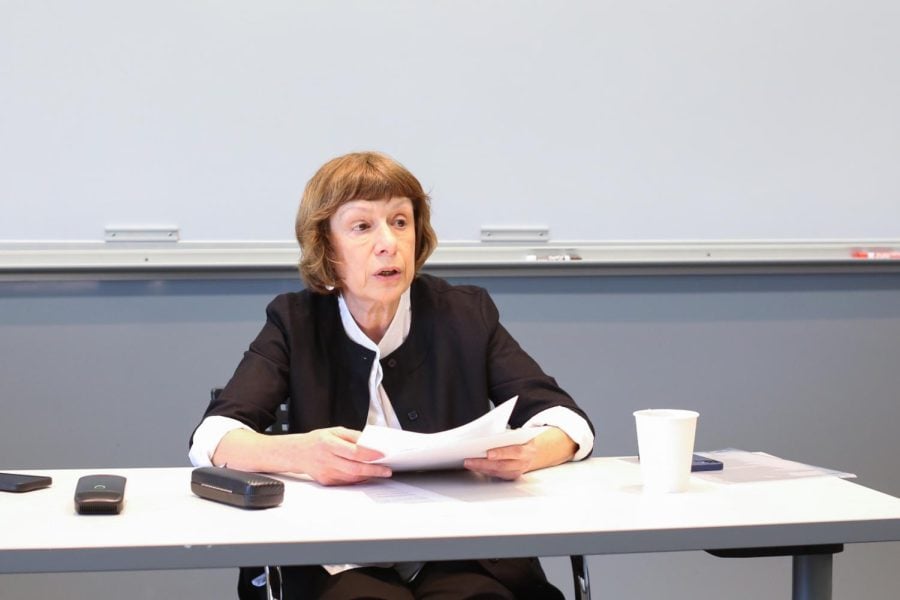Russian journalist Maria Lipman speaks on Russian citizens’ sentiments toward the war in Ukraine
Sofia Sorochinskaia/The Daily Northwestern
Russian journalist Maria Lipman spoke at the McCormick Foundation Center Monday about mixed Russian sentiment toward the war in Ukraine and Russia’s use of propaganda to influence public opinion.
March 7, 2023
Chief editor of Russia.Post Maria Lipman left Russia with her husband, Classics Prof. Sergey Ivanov, on March 6, 2022 — 10 days after the war in Ukraine began.
She left her normal life in Moscow, seeking refuge in Armenia, and later Germany, before arriving in the United States.
“My husband and I … decided we can no longer live in the country waging an atrocious war on its neighbor,” Lipman said.
During a Monday seminar held at the McCormick Foundation Center, Lipman discussed citizens’ support and distrust of the Russian regime and the country’s propaganda tactics.
Levada Center, a Russian independent sociological research organization, reported in February that 68% of Russians believe the country is on the right track, even during the war. According to Proekt Media, most Russian polls cannot be trusted due to low response rates, though Lipman suggests this may not be accurate.
“(The no response rate) is indeed high, but no higher than it was before the war, and barely higher than the no response rate is in the national polls in the U.S.,” Lipman said.
Lipman said many unconditional supporters of the war are older people from small towns who are not qualified for military service. They are often vulnerable and lonely — this population is also more likely to approve of Russian foreign policy in response to Russia’s place as a world power.
She claimed that many Russians agree with the government’s actions — as long as they can live their everyday lives without disruptions to daily routines.
Weinberg freshman Evgeny Stolyarov said his family, who lives in Russia, is among those mostly unaffected by the war. He said some of his relatives still believe in Russian propaganda.
“They see this much more like a fight with the West,” Stolyarov said. “They ask if we are experiencing (an) energy shortage … For them, the places where we are living are about to become inhabitable.”
However, he said his grandfather — who fought for democracy after Joseph Stalin’s death in 1953 — is now anti-war and watches the news on YouTube, often conferring with Stolyarov.
During the seminar, Lipman said the annexation of Crimea in 2014 gave the Russian people a sense of protection and pride, resulting in increased support for Putin.
“It is crucial that the annexation (of Crimea) was essentially Putin’s gift to his people, and a highly appreciated gift at that,” Lipman said, “It was his achievement, not the people’s.”
Weinberg Prof. Jordan Gans-Morse, who taught the course Slavic 390: Ukraine’s Long Fight for Independence — Literature and Politics in Central and Eastern Europe in Fall Quarter, attended the seminar and spoke about how some Russians justify the war.
Gans-Morse referenced Euromaidan, a series of protests and demonstrations in Ukraine from 2013 to 2014, as the beginning of anti-Russian aggression. He said it was possible some Russians considered the demonstrations as an attack on Russia, which could have spurred later aggression.
“This was just a defensive reaction (to them),” Gans-Morse said.
Russian propaganda fuels anti-Western sentiments, creating an image of the West as an “absolute evil,” according to Lipman. She also said sanctions on Russia from the U.S. and several European Union countries following the annexation of Crimea boosted propaganda against Western nations, even before Russia invaded Ukraine.
According to a March 2022 poll by the Russian Public Opinion Research Center, 71% of Russians perceive the U.S. in a negative light.
However, despite anti-U.S. sentiments perpetuated by the Russian government, Lipman described current pro-war protests in Russia as largely fabricated.
“These pro-war rallies are anything but grassroots … They are initiated, organized by government administrators,” Lipman said. “This is barely a secret.”
Email: [email protected]
Twitter: @_sofiasor_
Related Stories:
— Sergey Ivanov teaches Classics at Northwestern after fleeing his home in Russia
— Yale Law School Prof. Oona Hathaway speaks about legal implications of the Russia-Ukraine war
— Panel of professors and military experts discuss future of war in Ukraine












